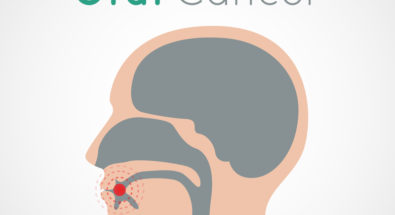Oral Cancer and Risk Factors
Regular dental checkups are imperative for excellent oral health and a lively smile. What you may not realize is that while your dentist is performing a dental checkup, they are also looking for oral tissue or lesions that can signify oral pre-cancerous lesions or oral cancer. Oral cancer is a devastating disease with no significant improvement in prognosis and high mortality. This is because the cancer is often discovered late in its development; not because it is hard to detect or diagnose. Your family dentist or oral maxillofacial surgeon is in the best position to detect oral cancer.
Your dentist will inspect your mouth for a variety of different symptoms such as:
- red/white spots or patches
- oral sores that easily bleed and have difficulty healing,
- crusty & rough patches and lumps.
If there are any worrisome or concerning oral lesions, your dentist may recommend and refer you to an oral and maxillofacial surgeon for evaluation and treatment of the oral lesions.
Are you aware that the risk factors that contribute to oral cancer can be tied directly to your daily habits? An estimated 25 percent of oral cancer patients have no known risk factors while alcohol and tobacco remain the great risk factors. When you combine alcohol and tobacco, you increase the risk 15 times over the use of one or the other. The sexually transmitted HPV16 virus has also been linked to a subset of oral cancers.
Here are a few factors that can contribute to oral cancer:
Tobacco
Tobacco is a commonly used plant that contains the very addictive drug known as nicotine. The cravings that nicotine produces has millions of people in the United States and Canada returning to use tobacco products. Cigarettes, cigars, hookah, and chewing tobacco are among the most commonly used ways to ingest tobacco. Although the feeling that nicotine provides may provide temporary satisfaction, prolonged use of tobacco can lead to devastating effects. Tobacco is the leading cause for head and neck cancers in the world, & more than 80% of people diagnosed with head or neck cancer have a detailed history of tobacco use. Chewing tobacco use is directly correlated to gum and cheek cancers, and secondhand smoke can also contribute to a string of oral health & respiratory concerns.
Alcohol:
Alcohol use has been known to increase your risk of contracting oral cancer; you pose an even higher risk when you mix tobacco use and drinking. Using tobacco and alcohol at the same time heightens your chances for oral cancer because the alcohol acts as a means of transport that assists the harmful chemicals in tobacco to reach the cells that line your mouth and your throat. Alcohol helps to absorb dangerous toxins found in tobacco which can furthermore damage your DNA. Alcohol will delay repairs to your damaged DNA which leaves you at a higher risk for developing forms of cancer.
Sex & Age:
Depending on your biological sex & age, you may be at a greater risk of developing oral cancer. Men are two times more likely to develop oral cancer than women are. Studies suggest this is because men tend to use alcohol and tobacco products more excessively than women, but also because men are at higher risk of developing HPV (human papillomavirus), which is a sexually transmitted disease often contracted through mouth-to-mouth contact & oral sex. For individuals over 55, your risk of oral cancer is doubled, and any oral concerns you may notice past 55 should be taken with extreme consideration, and a trip to the dentist should be scheduled.
Possible signs and symptoms
Even if you do not have any symptoms, you should see your family dentist or oral and maxillofacial surgeon if you experience the following:
- A sore or ulcer in the mouth or lip that does not heal
- A white or red patch on the lining of the mouth, tongue or gums
- Any abnormality that bleeds easily
- Numbness in the lip or mouth
- Lump or swelling on the gums or in the mouth and lips
- Sore under the denture that does not heal, even after adjusting the denture
- Painless firm lump on the side of the neck that has been there at least 2 weeks
- A sore throat of a sensation of something caught in the throat
What You Can Do
Your daily habits can have a tremendous impact on reducing the risks of developing oral cancer. Here are a few things you can do to ensure your oral health remains in good standing:
- Reduce alcohol consumption
- Reduce tobacco use
- Ensure you establish a healthy diet
- Wear sexual protection to avoid HPV
- Visit a dentist upon noticing any oral lesions, cuts, blood or any other concerns
- Brush & floss your teeth daily
- Perform regular self-examinations each month
- If you have risk factors, go see your dentist for annual examinations

